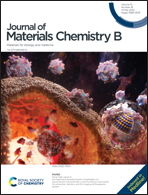pH-responsive polyelectrolyte complexation on upconversion nanoparticles: a multifunctional nanocarrier for protection, delivery, and 3D-imaging of therapeutic protein†
Abstract
The delicate tertiary structure of proteins, their susceptibility to heat- and enzyme-induced irreversible denaturation, and their tendency to get accumulated at the cell membrane during uptake are daunting challenges in proteinaceous therapeutic delivery. Herein, a polyelectrolyte complex having encapsulated therapeutic protein has been designed on the surface of upconverting luminescent nanoparticles (NaYF4:20%Yb3+,2%Er3+). This nanosized complex system has been found to overcome the challenges of protein aggregation at the cell membrane. It has also defended the cargo from denaturation against (a) enzymatic action of proteinase K and (b) heat (up to 60 °C). Additionally, the nanoparticles at the core of the loaded carrier served as near-infrared (980 nm) responsive probe to accomplish extended-duration 3D imaging during protein delivery. The outer layer of polymer played pivotal role to protect/retrieve the protein structure from denaturation as investigated by circular dichroism studies. Both the masked surface-charges of protein and the nanoscale size of the loaded carrier have facilitated their efficient passage through the cell membrane as observed through 3D images/videos. This nanocarrier is the first of its kind for direct delivery of protein. Thus, the findings can be useful to protect and transport various proteinaceous materials to overcome challenges of accumulation at the cell-membrane and low-temperature storage, as nature does.



 Please wait while we load your content...
Please wait while we load your content...